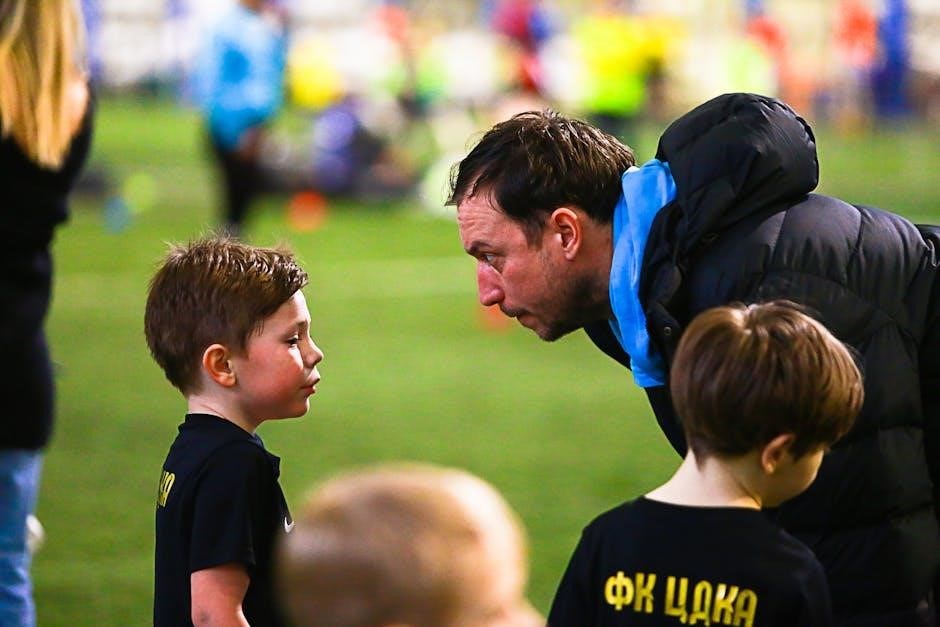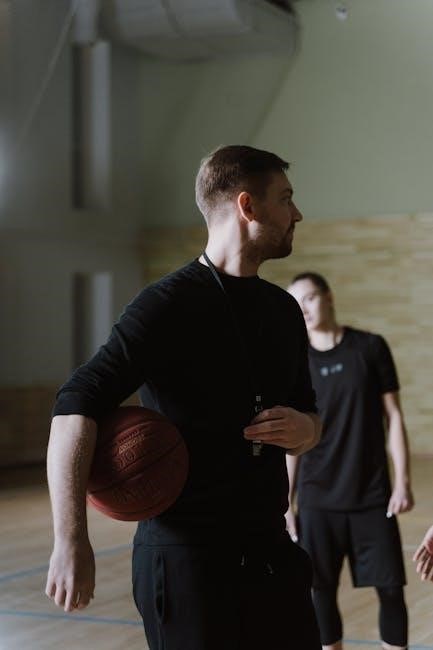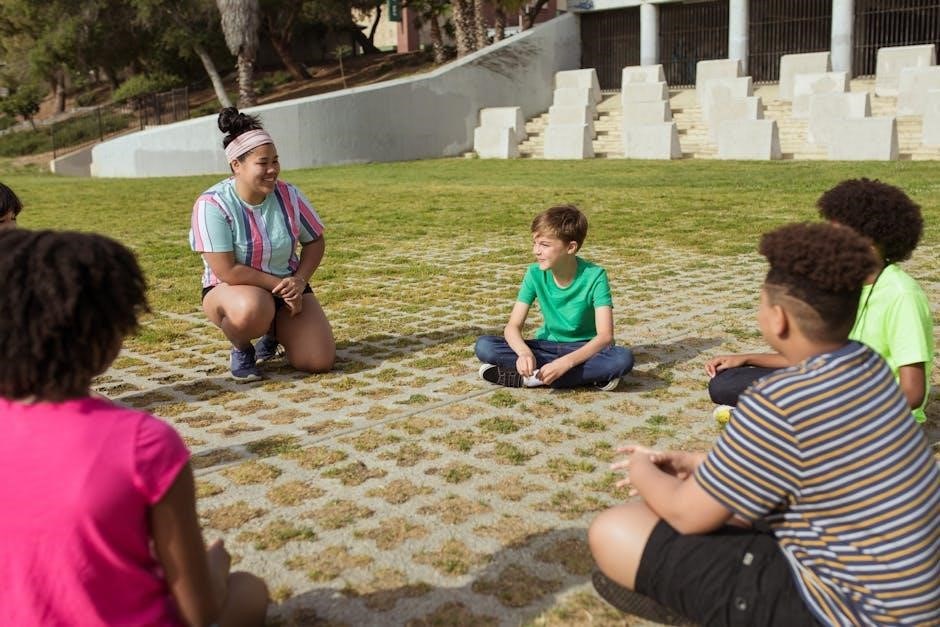The JROTC Leadership Education and Training Program offers high school students a structured curriculum focusing on leadership development, character building, and citizenship through both academic and practical training.
1.1 Overview of the JROTC Program
The JROTC program is a four-year high school curriculum sponsored by the U.S. Armed Forces, emphasizing leadership, citizenship, and character development. It combines classroom instruction with hands-on activities, community service, and extracurricular events. Cadets learn practical skills, ethical decision-making, and teamwork through structured training. Instructors, often retired military personnel, guide students in developing responsibility and confidence. The program fosters personal growth, preparing cadets for future careers, education, and active citizenship while promoting a sense of duty and service to their communities.
1.2 Importance of Leadership Education in JROTC
Leadership education is the cornerstone of the JROTC program, equipping cadets with essential skills to navigate challenges in both military and civilian life. By fostering decision-making, problem-solving, and ethical reasoning, JROTC prepares students to lead with confidence and integrity. The program emphasizes personal responsibility, teamwork, and effective communication, fostering a strong foundation for future success. Through hands-on training and real-world applications, cadets develop the resilience and moral character needed to excel as leaders in their communities and beyond.

Structure of the JROTC Program
The JROTC program is structured around a curriculum guide, LET courses, extracurricular activities, and leadership positions. It integrates classroom instruction, practical training, and community service to enhance leadership development.
2.1 Core Components of the JROTC Curriculum
The JROTC curriculum is designed to develop leadership, character, and citizenship through structured learning. It includes leadership theories, decision-making, and problem-solving skills. Cadets study health, wellness, and physical fitness, along with civic responsibilities and community service. The program emphasizes practical application, blending academic instruction with hands-on activities. This comprehensive approach ensures cadets build a strong foundation in leadership, ethics, and teamwork, preparing them for future challenges and responsibilities.
2.2 Leadership Education and Training (LET) Courses
The LET courses form the foundation of the JROTC curriculum, focusing on leadership development through structured lessons and practical exercises. These courses are divided into four core subjects, each building on the previous, to progressively enhance leadership skills. Cadets learn about leadership principles, communication, and decision-making, while also exploring civic responsibilities and ethics. Elective courses further tailor the experience, offering specialized training in areas like public speaking and team management. Hands-on activities reinforce theoretical concepts, ensuring cadets gain real-world leadership experience.
2.3 Role of Extracurricular Activities in Leadership Development
Extracurricular activities play a vital role in enhancing leadership development within the JROTC program. Through events like drills, competitions, and community projects, cadets gain practical experience in teamwork, communication, and problem-solving. These activities foster a sense of responsibility and accountability, allowing cadets to apply leadership principles learned in the classroom to real-world scenarios. By participating in these experiences, cadets develop confidence and critical thinking skills, preparing them for future challenges and reinforcing the program’s mission to build capable leaders.

Training Methods and Activities
The JROTC program employs a blend of classroom instruction, practical training, and hands-on activities to foster leadership and skill development. Community service and team-building exercises enhance learning.
3.1 Classroom Instruction and Theoretical Learning
The JROTC program incorporates classroom instruction to provide cadets with a foundational understanding of leadership principles, ethics, and military science. Through structured lessons, students explore theories of leadership, decision-making processes, and historical military strategies. Textbooks and curriculum guides are utilized to ensure comprehensive learning. Classroom activities emphasize critical thinking, problem-solving, and character development, preparing cadets for practical applications in leadership roles. This theoretical framework is essential for building a strong academic and moral foundation.
3.2 Practical Training and Hands-On Exercises
Practical training in JROTC involves hands-on activities that reinforce theoretical knowledge. Cadets participate in drills, simulations, and team-building exercises to develop leadership and problem-solving skills. Physical fitness training, uniform inspections, and mock command scenarios prepare students for real-world challenges. These exercises foster teamwork, discipline, and quick decision-making, ensuring cadets apply what they learn in the classroom to practical situations. Hands-on training is a cornerstone of JROTC, bridging theory with action to build confident, capable leaders.
3.3 Community Service and Its Impact on Leadership Growth
Community service is a vital component of JROTC, fostering leadership growth by engaging cadets in meaningful activities that benefit society. Through volunteering, cadets develop empathy, teamwork, and a sense of responsibility. These experiences enhance their ability to lead by example, demonstrating the importance of selflessness and initiative. Participating in local projects also builds confidence and strengthens interpersonal skills, preparing cadets to become active, compassionate leaders in their communities and beyond. Service reinforces the JROTC mission of developing character and citizenship.

Leadership Development in JROTC
JROTC fosters leadership development through structured programs, hands-on training, and real-world applications, empowering cadets to build confidence, decision-making skills, and a strong sense of responsibility.
4.1 Key Leadership Theories Taught in JROTC
JROTC emphasizes transformational and servant leadership theories, teaching cadets to inspire and empower others while prioritizing team needs. These theories, combined with situational leadership frameworks, help cadets adapt to diverse scenarios, fostering ethical decision-making and accountability. Through classroom instruction and practical exercises, JROTC instills these principles, enabling cadets to lead effectively in various roles.
4.2 Developing Decision-Making and Problem-Solving Skills
The JROTC program emphasizes the development of decision-making and problem-solving skills through structured activities and real-world applications, preparing cadets for leadership roles. Cadets engage in simulations, case studies, and team-based exercises that simulate real-life challenges, fostering critical thinking and adaptability. These exercises encourage cadets to analyze situations, evaluate options, and implement effective solutions. Through hands-on training and feedback, JROTC helps cadets build confidence in their ability to make sound decisions and navigate complex problems, enhancing their readiness for future challenges.
4.3 Cadet Leadership Positions and Their Responsibilities
JROTC cadets are assigned leadership positions that mirror real-world military roles, fostering practical experience. Positions range from Battalion Commander to Platoon Leader, each with distinct responsibilities. Senior cadets oversee operations, mentor juniors, and ensure unit goals are met. These roles teach accountability, delegation, and effective communication; Cadets learn to manage teams, resolve conflicts, and make informed decisions. Leadership positions are earned through merit, promoting a culture of excellence and preparing cadets for future challenges in both military and civilian life.
Community Service and Citizenship
The JROTC program emphasizes community service and citizenship, fostering a sense of civic responsibility among cadets. Through volunteer work and service projects, cadets engage with their communities.
5.1 Role of Community Service in JROTC
Community service is a cornerstone of the JROTC program, fostering leadership and responsibility by engaging cadets in volunteer activities that benefit society. These efforts include organizing food drives, participating in environmental cleanups, and supporting local charities. Through such initiatives, cadets develop a sense of civic duty and empathy while strengthening their communities. JROTC emphasizes that true leadership involves serving others, making community service an integral part of its curriculum. This hands-on approach helps cadets grow into compassionate and socially conscious individuals.
5.2 Promoting Citizenship Through JROTC Activities
JROTC activities are designed to instill a strong sense of citizenship and patriotism in cadets. Through participation in parades, ceremonies, and community events, cadets learn to respect and uphold the values of their country. These activities promote civic responsibility and encourage cadets to contribute positively to their communities. By engaging in such efforts, JROTC fosters a deeper understanding of democracy and the importance of active citizenship, preparing cadets to become responsible and engaged members of society.

Assessment and Evaluation
The JROTC program employs evaluations, inspections, and reviews to ensure cadets meet leadership and academic standards. These tools help track progress and maintain program excellence effectively.
6.1 Methods of Evaluating Cadet Performance
Cadet performance in JROTC is evaluated through written tests, inspections, and practical exercises. Instructors assess leadership skills, adherence to program standards, and participation in activities. Regular inspections ensure uniform standards are maintained, while performance reviews measure individual growth. Feedback from peers and superiors provides additional insights. These methods help cadets track progress and identify areas for improvement, fostering accountability and excellence in leadership development.
6.2 The Role of Inspections and Reviews in Maintaining Standards
Inspections and reviews are critical for ensuring cadets meet JROTC standards. These evaluations assess uniform appearance, drill performance, and knowledge retention, promoting accountability and discipline. Regular reviews help identify strengths and areas for improvement, while inspections maintain program integrity. Both processes foster a culture of excellence, preparing cadets for future leadership roles by reinforcing attention to detail and adherence to established guidelines. This systematic approach ensures consistent growth and readiness among all participants.
Benefits of the JROTC Program
The JROTC program fosters personal growth, enhances leadership skills, and prepares cadets for future careers. It promotes discipline, teamwork, and civic responsibility, shaping well-rounded individuals.
7.1 Personal Growth and Character Development
The JROTC program significantly contributes to personal growth by fostering self-confidence, discipline, and responsibility. Cadets engage in physical fitness, uniform wear, and team-building activities that enhance their character. The curriculum emphasizes ethical decision-making, respect, and accountability, helping students develop strong moral foundations. Through leadership roles and community service, cadets gain a sense of purpose and maturity, preparing them to become responsible citizens. These experiences cultivate resilience and integrity, essential for lifelong personal and professional success.
7.2 Preparation for Future Careers and Education
The JROTC program equips cadets with essential skills for future careers and education, fostering leadership, critical thinking, and problem-solving abilities. It prepares students for both military and civilian paths by emphasizing discipline, responsibility, and teamwork. The program also offers mentorship and guidance, helping cadets explore post-secondary opportunities, including scholarships and college readiness. By building a strong foundation of skills and confidence, JROTC sets students up for success in their chosen career fields and lifelong learning pursuits.
7.3 Scholarship Opportunities for JROTC Cadets
JROTC cadets gain access to numerous scholarship opportunities, rewarding their dedication and leadership skills. These scholarships support higher education and vocational training, helping cadets achieve their academic and career goals. Many organizations and military branches offer financial assistance to JROTC graduates, recognizing their commitment to service and leadership. Additionally, the program provides guidance on applying for scholarships, ensuring cadets can pursue their aspirations without financial barriers. This support underscores JROTC’s role in empowering cadets for future success.
Real-World Applications of JROTC Training
JROTC training equips cadets with practical skills like teamwork, communication, and problem-solving, applicable in everyday life, careers, and community service, fostering real-world readiness.
8.1 Success Stories of JROTC Alumni
JROTC alumni consistently demonstrate exceptional leadership and character, excelling in military, academic, and professional careers. Many credit JROTC for instilling discipline, confidence, and critical thinking skills. Graduates often pursue higher education, serve in the armed forces, or lead in their communities. Their achievements highlight the program’s effectiveness in shaping future leaders. By fostering a strong work ethic and moral foundation, JROTC equips cadets to succeed in diverse pathways, making a lasting impact on their personal and professional lives.
8.2 Impact of JROTC on Local Communities

JROTC programs significantly benefit local communities by fostering civic engagement and responsibility. Cadets often participate in community service projects, such as cleaning parks, organizing food drives, and supporting local charities. These activities strengthen community bonds and promote a sense of pride. Additionally, JROTC units frequently collaborate with local organizations to address pressing issues, demonstrating the program’s commitment to improving neighborhoods and developing responsible citizens. This involvement highlights JROTC’s role in creating positive change beyond the classroom.
The JROTC Leadership Education and Training Program effectively fosters leadership, citizenship, and personal growth, preparing cadets for future challenges while benefiting local communities through service and engagement.
9.1 Summary of the JROTC Leadership Education and Training Program
The JROTC Leadership Education and Training Program is a comprehensive curriculum designed to equip high school students with essential leadership skills, character development, and citizenship values. Through a blend of academic instruction and hands-on activities, cadets learn decision-making, problem-solving, and teamwork. The program emphasizes community service, physical fitness, and mentorship, fostering personal growth and preparing students for future challenges. Its structured approach ensures cadets develop the confidence and responsibility needed to excel in both military and civilian life.
9.2 The Future of JROTC and Its Continued Relevance
The JROTC program remains a vital institution, adapting to modern challenges while fostering leadership and citizenship. Its emphasis on character development, community engagement, and practical skills ensures its continued relevance. By evolving with societal needs, JROTC prepares cadets for future challenges, whether in military or civilian roles. The program’s focus on adaptability, teamwork, and ethical decision-making equips students to thrive in a dynamic world, solidifying its importance for generations to come.



